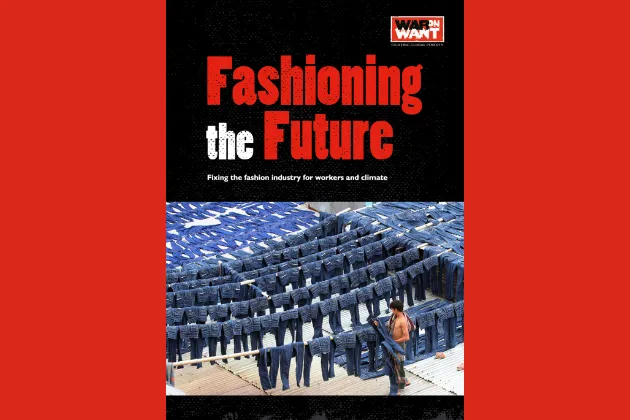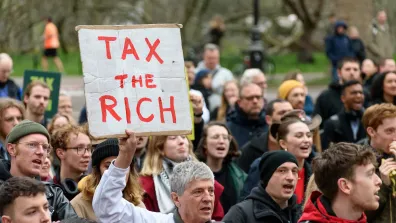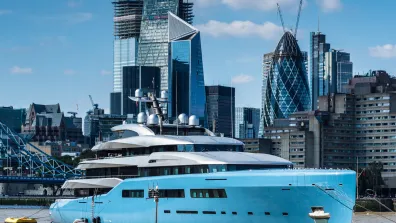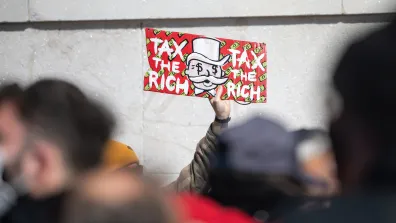President Trump’s tariffs will hit workers the hardest
One answer lies in our rigged trade system – which reinforces colonial dynamics, with the Global South serving the needs of the Global North; and where globalised supply chains allow big corporations to profit at the expense of people and the planet. Now, the tariffs threaten to push Global South countries into further instability.

The rigged trade system
For decades, the global economy has been structured around the idea of ‘free trade’ – the removal of policies that big corporations consider barriers to the flow of goods and services across borders.
Among these barriers are tariffs – taxes that governments impose on imports to protect domestic companies from foreign competition. Tariffs increase the cost of imports for the country that imposes them. Importers then pass on increased prices to consumers to preserve their profits. As a result, tariffs can be a useful tool to grow a domestic economy – making imports more expensive, so consumers instead buy local goods.
Despite relying on tariffs historically to grow their own economies and corporations, governments across the Global North have long claimed that reducing tariffs is the best route to global prosperity. But in reality, reducing tariffs has been a way for Global North countries to guarantee access to cheap Global South imports.
Together with other restrictive trade rules, low tariffs ensure that most Global South countries sit at the bottom of the global economy, trapped in colonial dynamics: dependent on producing cheap raw materials and low value goods for consumption in the Global North – instead of producing for their own needs.1
Why Trump’s tariffs aren’t the answer
In theory, tariffs, when combined with government investment, can support the development of domestic economies and the creation of decent, green jobs. But in our globalised world, all countries are linked through trade – so unilateral tariffs imposed by powerful countries can be damaging for everyone.
President Trump’s tariffs take a sledgehammer to the economic system that the US has played such a large role in building. But the US government isn’t concerned about global justice, let alone US workers – who now face a looming recession.
Instead, the US is using a unilateral 10% tariff to bully the world into signing free trade deals that favour US corporations, such as big tech companies based in the US (including Amazon, Apple and Meta), and buying more US-made products. At the same time, the US government is gutting the public sector and abandoning existing support for investment in the green economy.
The US is now weaponising global trade links and using them to isolate China – the world’s second largest economy – which faces US tariffs of around 140%. If President Trump doesn’t achieve his goals of forcing other countries to buy more US goods by July 2025, he has promised to raise tariffs on the rest of the world even further, with poorer countries in Asia facing the steepest hike.
The impact of US tariffs globally
In the US, tariffs on imports means a new round of inflation, as imported products will now cost more. As a result, people and businesses in the US are likely to switch to more affordable, local products where they exist, or cut back their consumption altogether.
Lower demand for goods including clothes and food will mean fewer exports from the Global South countries that rely on these industries – with a devastating impact on people’s livelihoods.
Poorer Global South countries, which simply cannot afford to meet Trump’s demand of buying more US products, will bear the greatest burden. This is no coincidence, given the sacrifices these countries have already made as they were incorporated into the global economy.
In the 1980s and 1990s, the US-dominated International Monetary Fund (IMF) and World Bank pressured countries including Pakistan, Sri Lanka and Bangladesh into accepting debt-creating loans in exchange for implementing austerity policies to reduce public spending, and restructuring their economies away from the needs of their own people (locally-grown food, energy, and infrastructure) – towards producing cheap exports for the Global North.
Pakistan, Sri Lanka and Bangladesh now all depend on US dollars flowing into their economies to pay for vital food and energy imports, as well as to repay debts owed to foreign creditors like the IMF.
Today, the US is the largest export market for all three countries, with US consumers benefiting from access to cheap clothes and crops produced by these Global South workers on low wages. At the same time, the majority of profits made in Pakistan, Sri Lanka and Bangladesh flow to corporations in the Global North2, such as US-based brands Nike3 and Gap4.
With export earnings falling alongside foreign demand, Global South governments are likely to take on even more debt to finance the imports of essential goods – restarting the rigged economic cycle all over again.
Workers face the brunt of tariffs
When economies in the Global South suffer, it’s workers who bear the cost. Most garment workers in Bangladesh are paid less than £4 a day. Many work with little time off and meagre benefits – which are now under threat.
Factory owners are already using the tariffs as an excuse to cut our hard-won benefits and to threaten jobs.
In Pakistan, up to 500,000 jobs could be lost in the textile and garment sector as tariffs hike up clothing costs in the US, and people buy less – pushing Pakistani workers into the informal economy, where labour laws are rarely implemented.
The Pakistani government “will use these tariffs to further deregulate labour markets, suppress wages, and crush worker organising.” - Khalid Mahmood, Labour Education Foundation, Pakistan
The impact of tariffs on the UK
Economists argue that President Trump’s ever-changing tariffs, and the climate of volatility they create, are likely to cause a recession in the US.5 The effects of this threaten to ripple across the world, including in the UK, increasing the likelihood of a global economic slowdown.
Despite UK Prime Minister Keir Starmer’s frequent appeals to the UK’s 'special relationship' with the US, the US government is using tariffs as leverage to push for a UK-US trade deal that threatens to slash regulations around big tech and gives US corporations access to private NHS data.6
Khalid Mahmood, Director of the Labour Education Foundation in Pakistan and Anton Marcus, Joint-Secretary of the Free Trade Zones & General Services Employees Union (FTZ&GSEU) explain the impact of tariffs on garment workers.
We need radical change
Our trade system has failed both the Global South, and workers in the US and UK, who have seen their living standards collapse in recent decades as big corporations cut investment in local jobs, while reaping record profits globally. The global economy is failing all but the super-rich and corporations – the economic system is rigged for the richest in society to profit at the expense of everyone else.
Capitalising on this discontent, the far-right is growing, placing the blame on anything deemed ‘foreign’ – whether goods, countries, people or ideologies.
President Trump’s reckless tariffs, and destabilisation of the global economy, are confirmation that the international trading system is broken. But we cannot fix a broken system with the same ‘free trade’ system that got us here in the first place.
The tariff crisis provides the UK with an opportunity to reset its trade relations with the rest of the world. This means breaking free from restrictive trade rules and working in genuine partnership with the Global South, so all countries benefit equally from trade.
Now more than ever, we need to fight for a decolonised global economy, for an economic system capable of delivering a world where people can live a dignified life without inequality and poverty, in fairer, greener societies.



